
Commentary: Conception of Jesus Revealed
According to modern astronomical software, the Star of Bethlehem reached its zenith on June 17th, 2 B.C. This was the date Jesus was born. If we look back nine months, we see in the morning sky above Israel another astronomical sign concerning the conception date of Jesus.

John saw this exact same sign in a vision (Revelation 12:1). And once again, modern computer software shows that this astronomical configuration appeared over Israel on the morning of September 11th, 3 B.C. This date in the month of September coincides with the final three annual Fall feasts of the Jews known collectively as Rosh Hashanah. These three feasts are the Feast of Trumpets or announcement, then ten days later the Feast of Yom Kipper or the High Holy Day for the repentance of sins, followed by the Feast of Tabernacles, which prophesies a time when God will live among mankind.
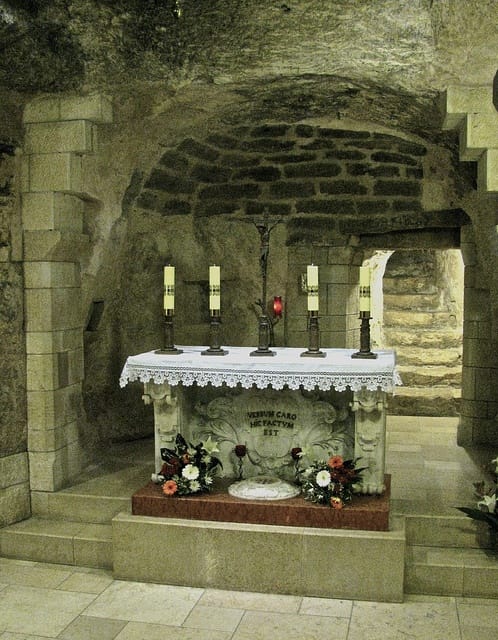
Mary is 13 or 14 years old, engaged to Joseph and alone in the home of her parents in the village of Nazareth. Numerous first century Jewish female grave markers have recently been excavated with engravings stating their attained age at the time of their marriage. The vast majority were married between the ages of 13 and 14. These are also the ages that the Jewish Midrash encourages females to become engaged and married. The ancient village of Nazareth was established by 1,400 B.C. and was located on a caravan trade route that ran between Egypt and Mesopotamia. Joseph was also raised in Nazareth with his family’s home located across the street from Mary’s home. These two homes became venerated by pilgrims before the end of the first century. They both had churches constructed over them by Helena the mother of Emperor Constantine the Great, c.325 A.D. On the day of Mary’s visitation by the angel Gabriel, Joseph was either working with his father in their shop, or seventy miles away in Jerusalem attending the feasts of Rosh Hashanah as was required by Law for all healthy Jewish males above the age of nineteen.
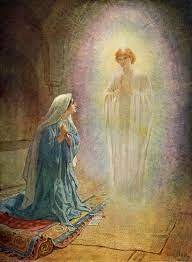
The Angel Gabriel suddenly appears to Mary standing in the doorway of her parents home. Gabriel is always named as the messenger Angel from God. Only three angels are actually named in the Bible. They are Gabriel the messenger, Michael the protector of God’s people, and Lucifer also known as Satan meaning the accuser of mankind. The Book of Enoch mentions the names of many other angels however, this text has been determined by Biblical scholars to be pseudepigraphal or inauthentic. It is not referenced in the Old Testament, but is mentioned in passing three times in the New Testament.
The facts concerning the conception of Jesus are only found in the Gospel of Luke, a physician. Luke, who was not one of the twelves disciples, states that he compiled his biography of the ministry of Jesus by collecting information from a variety of sources including eye witnesses to certain events. This would imply that Luke personally met with Mary in compiling the following birth narrative (Luke 1: 1-4).
Luke 1:26- “And in the sixth month,” We will learn later that this time refers to the fact that Mary’s blood relative and possibly her aunt Elizabeth was now six months pregnant with a son to be known as John the Baptizer. It may also refer to the fact that Mary was six months into her traditional one year engagement to Joseph. Six is the Biblical number of Man. “...the angel Gabriel was sent from God to a city in Galilee, called Nazareth.” Gabriel is the official messenger of God. He is always used by God to assist those who have faith in God such as Joseph and Mary and deliver prophecies as with Daniel that are directly connected with Jesus. According to modern astronomical software, it was in the Judean night sky of September 11th, 3 B.C. that the constellation Virgo appeared rising above the horizon with twelve stars over her head and a new moon at her feet. The disciple John would later see and write of this event in a vision he records in the Book of Revelation (Revelation 12:1). He apparently did not know what this part of his vision meant, but was told to write it down (Revelation 1:19). Again, this vision that John saw actually occurred on September 11th 3 B.C.

This date may have been the Fall Feast of Trumpets at which time the Shofar is sounded on the Temple Mount and officially signals the Fall harvest to begin. This date is also celebrated as Rosh Hashanah or the Jewish New Year. This feast was the shadow event of the announcement by Gabriel that the Jewish Messiah was about to be born. Then, the following ten days is known as the ‘Days of Awe’ or the ‘High Holy Days’ ending on the Fall Feast of Yom Kippur. This is considered by Jews as the highest and most holy of all the 7 annual feasts. It is joyous but also solemn as it is a time when the Jews pay to have their sins covered and be allowed to live another year. It is also the only time that an animal is sacrificed by the Hight Priest and its blood sprinkled on the Ark of the Covenant in the Temple. So, Gabriel most probably met with Mary on the Feast of Trumpets to make her the offer to be the mother of the Messiah. Then ten days later on Yom Kippur, Mary would have conceived. Thus, these three Feasts were always only shadow prophecies concerning the events that led to the conception of Jesus.
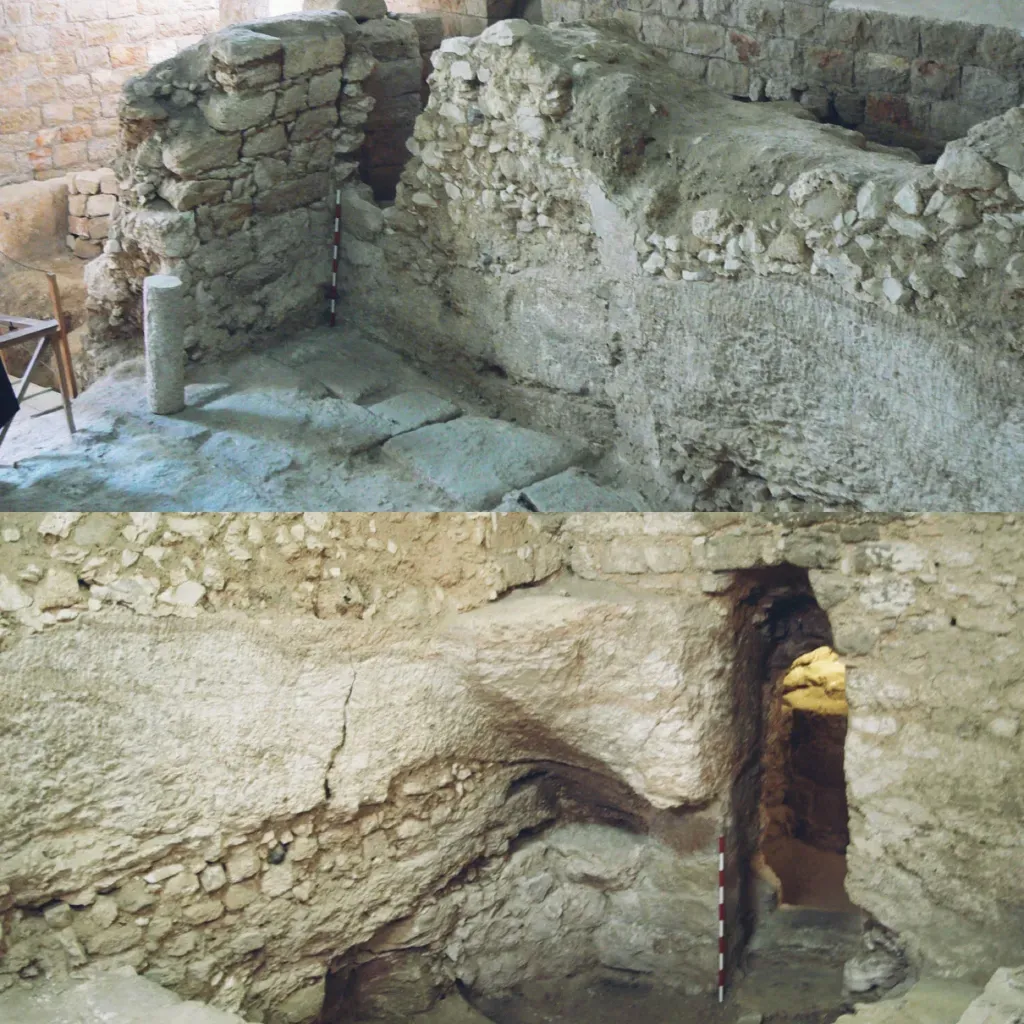
The small village of Nazareth is not mentioned in the Bible or in the Talmud nor by the famous Jewish historian Flavius Josephus. It was considered an obscure village filled with devout Jews, but of no geographical or political importance. As the disciple Nathanael once said, “Can anything good come from Nazareth?” (John 1:46) Only Luke tells us where Mary and Joseph lived at this time. Recent modern excavations have located with certainty these two houses in Nazareth.
Luke1:27- “To a virgin...” The term in Greek is Parthenos and Jewish scholars translate this word from Greek to Hebrew as Ha-alma which translates to English 'the' virgin or singular as in the one and only whoever was or will be as it relates to this particular conception. Isaiah the prophet had three Hebrew words he could have chosen from to express the words young girl in his prophecy concerning the coming Messiah. He apparently intentionally chose to use the word Ha-alma which means a singular {exceptional} virgin. “...espoused to a man whose name was Joseph, of the house of David.” Joseph was engaged to Mary and is called a man meaning an adult male. This would mean, according to Jewish law, that he was above the age of nineteen. The term house of David refers to his blood line which could be traced directly back to King David circa 1,000 B.C. (Matthew 1:1-17)“...; and the Virgin’s name was Mary.” The word 'virgin' is capitalized by Luke to signify that Mary was literally The Virgin prophesied by Isaiah and to signify that she was the one and only Virgin to ever give birth. This idea of a virgin birth can only be explained by way of God creating this one time only supernatural event for a specific reason. While this event was clearly prophesied by Isaiah, it was not and is not understood by Jewish scholars. A virgin birth was seen as unnatural and unnecessary. The Jews were simply looking for a new King David who would rid the land from its pagan Roman occupiers not a man-God. Therefore, they insist on translating the word Ha-alma to mean a young girl and not a virgin in order to remove what they see as the stigma of an unnatural birth of their coming Messiah. But this is an obvious disingenuous twisting of the phrase because Isaiah stated that as a sign from God, a virgin would conceive. And there can be no sign attached to a young girl giving birth. In the first century, young teen age girls regularly married and gave birth as previously noted.
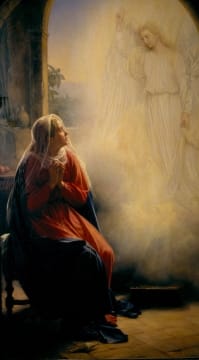
Luke 1:28- “And the Angel came 'in' unto her and said, Hail, you {who are} highly favored, the Lord is with you: blessed {are} you among women.” This simple sentence presents the greatest moment in human history with the exception of the death, burial and resurrection of Christ. Gabriel apparently first appears to Mary by stepping in through the doorway so as not to be in the public view. He immediately says the word Hail which expresses an enthusiastic joyous salute due to a great success. He then states that by this visitation, she is considered highly favored or blessed by God. A better translation is you are much engraced and not you are full of grace or without original sin. In other words, through her faith in God and her blood line, she was merited my God as being worthy to give birth to Jesus the Messiah. The only other time this term is used is in Ephesians 1:6. In both cases the inference is that a person is only highly favored by God through their relationship with Jesus. She was highly favored because she would carry Christ inside her. Believers are highly favored because they now carry Christ in them by way of the indwelling of the Holy Spirit. This verse is the official start of the New Testament. “..., the Lord is with you:” meaning her faith had made it possible for her to be seen as righteous enough that the Lord was now with her and ready to work a miracle through her if she was willing to accept His offer, "blessed are you among women”. Mary was not blessed above women nor beneath other women. The phrase is a distinction signifying that this event now taking place was a sign from God that while Mary did not ask for this honor, it was a reward for her genuine faith in God.
Luke 1: 29- "And when she saw {him}, she was troubled at his saying, and cast her mind {as to} what manner of salutation this should be." When Mary saw or fully realized that she was speaking to an angel sent from God who told her she was favored by God, she became anxious as to where this conversation was leading. So, she understandably became troubled or upset if only because traditionally, the appearance of an angel was thought to be an omen of impending death.
Luke 1:30- "And the Angel said to her, “Fear not, Mary: for you have found favor with God." A better translation is “you have received unmerited grace from God”. The angel understood that there was a certain amount of anxiety beginning to grow in the mind of Mary. So he calmly and gently tells her she has nothing to fear and that he brought good news of great joy. Thus the use of his introductory word “Hail” or Greetings. This is the first time we learn that the angel knows her name.
Luke 1:31- And, behold {understand}, you shall {forthwith}conceive in your womb, and you shall bring forth a Son, and shall call His name JESUS". A better translation is “you will surely conceive in your womb and give birth to a {healthy} Son, and you will name Him Jesus.” The Angel is asking her to concentrate and understand that, if she is freely willing to accept this offer from God, she will become pregnant, deliver a male child in nine months, and is required to name him Jesus. The Greek version of the Hebrew name Joshua is Jesus meaning “Savior” or “The Salvation of Jehovah” or “The Lord Saves” (Isaiah 7:14; 9:6). It was Jewish tradition that the father retained the sole right to name his children not the mother. However, since God and not Joseph would be the biological Father of Jesus, He was allowed to name His only physically begotten son. Just as Moses under the Law was not allowed to enter the Promised Land, Joshua through faith in God, was allowed to lead his race of people into the Promised Land (Joshua 1:1-3). Jesus will one day Rapture and lead His people into the promised land of Heaven. Seven years later, at His Second Coming, He will Rapture them back down onto the earth and give them immortality and governance duties for one thousand years. (Revelation 19:14).
Luke 1:32- “He shall be great, and shall be called the Son of the Highest; and the Lord God shall give unto Him the throne of His father David.”(Isaiah 9:6-7) Jesus will be called great both in His intellect, teachings, miracles, resurrection from the dead and as founder of the largest religious movement in the history of the world. He will also be called during His ministry and after His resurrection, the Son of God or Son of the Most High. And, God the Father will personally give to Him the throne of His great grandfather David and the exclusive right to rule over God’s chosen people the twelve tribes and nation of Judah or Israel. This was the only action the Jewish leaders of the first century were interested in seeing the Messiah accomplish.
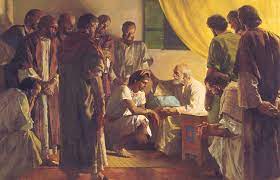
Luke 1:33- “And He will reign over the House of Jacob forever: and of His Kingdom there shall be no end.” Jacob had twelve sons that became the twelve tribes of Judah. God gave Jacob a second name of Israel (Genesis 32:28; Genesis 35:10). So, today we would translate this prophecy to say that Jesus will be given total self-rule over the Jewish race of Israel for eternity. And, He will also reign over the land of Israel and the entire world for eternity. Upon His resurrection, Jesus body was now translated from mortal to immortality (I Corinthians 15:53-55). And because His spirit was the eternal Word of God, He was now capable of physically ruling the earth and all creation eternality. This initial rule over Israel and the entire earth will begin with His Second Coming followed by His Millennial Reign (Revelation 20:6).
Luke 1:34- “Then Mary said to the Angel, How can this {my pregnancy} be, seeing I know not a man?” These are the first recorded words of Mary. Her husband Joseph is never quoted in the New Testament nor is he ever referred to as Jesus’ father. Mary’s question is not a lack of faith, but a simple statement of fact. Her engagement period was not over, they had not held a marriage ceremony as required by Jewish law, and it was against the known laws of nature to become pregnant without the assistance of a male.
Luke 1:35- “And the Angel answered and said to her, The Holy Spirit will come upon you, and the power of the Highest will overshadow you: therefore also will that Holy thing which will be born of you will {can rightfully} be called the Son of God.” Mary’s straightforward question is answered by a straightforward explanation of a supernatural event. Mary is told that the Holy Spirit or power of God will come upon her. This imagery is very similar to the one given in Genesis where God, in order to bring physical light back into the world, first has the Holy Spirit overshadow the waters just before He gives the command, “Let there be light” (Genesis 1:3). In the case of Mary, the Holy Spirit will first indwell her creating a conduit to God the Father. Then the Holy Spirt will supply the 23 chromosomes necessary to combine with those of Mary's egg to produce the physical body that the Word of God will indwell. This will allow her to give birth to a human male in the lineage of David yet at the same time, a Devine body free from the original sin of Adam. This ultimately creates a perfect unblemished human fit to be sacrificed on behalf of the sins of mankind.
The Holy Spirit was recognized as an entity by the patriarchs, prophets and David. The problem was that while the Spirit would come upon them to assist in their mission, or to pronounce a prophecy, once the mission was completed, the Holy Spirit would leave. Here we see the same situation, the Holy Sprit would temporarily indwell or overshadow Mary in order for God the Father to cause her to conceive. In medical terms, God would at that time, supply Mary’s egg consisting of 23 pairs of chromosomes with the needed 23 pairs of male chromosomes in order for her to become pregnant. God would also furnish the Y chromosome necessary to ensure that the body was a male. We now understand that her conception had to happen this way and here’s why.
When Adam sinned, God placed a series of temporary curses on him or mankind. One of these curses was that from that moment on, all human males would inherit a sin induced gene that causes all their offspring to have a genetically induced proclivity to sin. Therefore, Jesus could not be created by the chromosomes of a human male or He would inherit Adam’s original sin curse and this would make Him a flawed or blemished sacrifice in the eyes of God. After Mary conceived, the Holy Spirit appears to have disengaged from her because her sin debt had not yet been paid by Jesus on the cross. It does appear that the Holy Spirt may have inspired her to give a tremendous prayer to the greatness of God known as The Magnificat (Luke 1:46-55). Fifty days after Jesus’ resurrection, and during the Feast of Pentecost, Christ kept His promise to His disciples now Apostles, and sent the Holy Spirit to permanently indwell all followers reborn in the Spirit including Mary (Acts 2:1-4).
So, Jesus was literally half human from Mary and so could rightly be called the Son of Man. But, His biological Father was God, therefore He could rightly be called the Son of God. While some in the crowds called Jesus the Son of God, Jesus preferred to call Himself the Son of Man for two reasons. First, His physical incarnation as a man was appropriate as His mission was to defeat death on behalf of Mankind and create a path to eternal life. The second reason He did not use His rightful title of the Son of God was because it infuriated many of the religious leaders and made His ministry more complicated for Himself and more dangerous for His followers. He would ultimately agree to this title at His trial with the High Priest Caiaphas as He could not tell a lie, and in order to insure He would be crucified (Luke 22:70).

Luke 1:36- “And, behold {know}, your cousin {relative} Elizabeth, she has also conceived a son in her old age: and this is the sixth month with her, who was called barren.” As one might imagine, this was quite an information down load of for a young teenage girl to comprehend. So it is understandable that Mary may have thought she was having a dream or a hallucination. Gabriel sensed a growing skepticism in her mind, so he told her something that only God, Elizabeth and her husband knew at this time. He told her that Elizabeth was now six months pregnant with a boy even though she was thought to be barren due to her advanced years. No one but Elizabeth and possibly Zacharias knew this, and it was apparently decided to keep her pregnancy a secret until she knew for certain that she would not miscarry the child (Luke 1:24-25). While this was not a sign Mary asked for, God knew it would help strengthen her faith at this moment, and help her resolve when she had to deal with Joseph’s negative reaction upon being told that she was miraculously made pregnant by God.
Luke 1:37- “For with God nothing will be impossible.” This is the same phrase a pre incarnation of Christ said to Abraham and Sarah when He told them that she would conceive and give birth at the age of ninety. Sarah is the only woman in the Bible to ever have laughed in the face of God (Genesis 18:12-15).
Luke 1:38- “And Mary said, Behold the handmaid of the Lord; be it unto me according to your word. And the Angel departed from her.” Mary told the Angel that as a dedicated handmaid to the service of the Lord, she was ready and willing to accept the terms of his request as explained to her. In a way she saying, ‘I Mary, being of sound mind and body, do hereby agree to have done unto me all that the Lord has requested of me’. Mary conceived and waited with cautious optimism as to Joseph’s reaction to the news that an angel had made his fiancé pregnant. The Angel left as quietly and unnoticed as he had arrived.
Luke 1:39- “And Mary arose in those days, and went into the hill country with haste, into a city of Judah.” After Joseph returned home, he was at first extremely upset about the news that Mary was pregnant. He knew that according to Jewish law, he could end the engagement, and Mary could be stoned to death on her father's doorstep. But an Angel appeared to him in a dream and told him to believe in Mary and to immediately marry her (Matthew 1:19-21). It must have been an extraordinarily vivid dream as Joseph apparently awoke and immediately married her. However, he did not sleep with her until Jesus was born. It was only then that they were allowed to start a family (Matthew 1:24-25). After the wedding, Mary immediately left Nazareth and traveled one hundred miles south to the city of Hebron. She was excited to visit with Elizabeth and see that she was in fact six months pregnant.
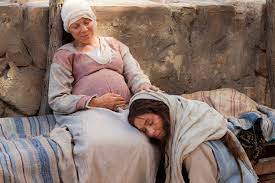
Luke 1:40- "And {Mary} entered into the house of Zacharias and saluted {called out to} Elizabeth."
Luke 1:41- “And it came to pass, that, when Elizabeth heard the salutation of Mary, the baby {John} leaped in her womb; and Elizabeth was filled with the Holy Spirit." Elizabeth was apparently in another room when she was startled to suddenly and unexpectedly heard the voice of Mary. In that exact same moment, the sound of Mary’s voice calling out to Elizabeth, and the proximity of Jesus to her unborn son John, caused them both to simultaneously feel the indwelling of the Holy Spirit.
Luke 1:42- And she {Elizabeth} spoke out in a loud voice and said, Blessed are you {Mary} among women; and blessed is the fruit of your womb." Scripture does not tell us that Elizabeth was given this information concerning the pregnancy of Mary by others. Instead, it implies that she spontaneously received this knowledge when she was indwelled by the Holy Spirit. This would make Elizabeth, at least for the moment, a prophetess. Her ability to recognize Mary, as blessed by God due to her pregnancy with Jesus, might have come by way of her son John who was appointed by God to announce the coming of the Messiah. John also stated that God had promised him that when the Messiah arrived, he would personally see the Holy Spirit settle on Him. This event happened at Jesus’ baptism (John 1:33). So it may have been that the spirit in John immediately recognized the Spirit of Jesus and he acknowledged this superior spirit from God by being moved in Jesus' presence. You might say that John was already letting at least his mother know that the Kingdom of God was literally at hand because of the presence of Jesus (Luke1:41-44). The Holy Spirit moved on Elizabeth as shown through her blessing on Mary and her unborn child Jesus.
Luke1:43- “And why is this to me, that the mother of my Lord should come to me?” In other words, Elizabeth was asking why she was being honored by having the mother of her Lord come to visit her instead of her going to honor them. Elizabeth may be implying that she had decided to visit Mary, but only after John was born due to the physical stresses associated with travel. Unfortunately, Mary would be forced to travel seventy miles to Bethlehem while nine months pregnant only to give birth in a stable located in a cave adjacent to a public inn once the ancestral home of King David.
Luke1:44- “For, as soon as the voice of your salutation {greeting} sounded in my ears, the baby {John} leaped in my womb for joy.” As stated earlier, this action by John was a reaction to the manifestation of the Holy Spirt along with the blessing that Elizabeth gave to Mary and Jesus in the Spirit.
Luke1:45- And blessed is she {Mary} who believed {in faith}: for there shall be a performance of those things which were told thee {to you} from the Lord”. Mary came to believe the words of the Angel in faith. Joseph did not initially believe the story that Mary told him. Nor did the husband of Elizabeth believe the message of the Angel who told him that Elizabeth would give birth. The words “shall be” mean a certitude of action engendered by God the Father. Every time a woman in the Bible prays, her prayers are answered. This is because women have faith and do not quit praying until their prayer is answered. Men are often cited as not praying in complete faith and often enough, therefore their prayers are not always answered. Faith and tenacity are the conduits that allows God to answer prayers.
Elizabeth must still be indwelled by the Holy Spirit as she pronounces two more blessings and is assuring Mary that all she was told by the Angel concerning the accomplishments of Jesus would come to fruition. This implies that Elizabeth, by way of the Holy Spirit, knew most if not all of the information the Angel gave to Mary concerning her conception and the mission of Jesus. Elizabeth knew about her own sons mission because the angel Gabriel came to Zacharias and gave him a detailed prophecy concerning their sons future abilities (Luke 1: 10-17). She no doubt assumed he would accomplish all those things as a Temple priest, but she was wrong. While Elizabeth had faith, her priest husband doubted the message that Gabriel gave to him concerning birth of a son. So, for the duration of Elizabeth’s pregnancy, Zacharias was struck speechless. There is some indication in the Greek texts that he was also struck deaf (Luke 1: 18-22; Luke 1: 62-66).
Luke 1:46-55- The following ten verses are referred to as The Magnificat in that Mary gives a soliloquy in which she praises the Lord. These verses actually constitute a song of praise in the tradition of the “Song of Deborah” (Judges 5:1-31). She is actually magnifying the Lord and not herself. Mary states that God is her savior therefore, she must have considered herself a sinner in need of salvation as are all people (Romans 3:23). She states that all generations will call her blessed. Not because she was an extraordinary person in and of herself, but because she had been gifted the privilege of serving as the mother of the Messiah or Savior. The word blessed as used here is a single syllable so it simply means “a recipient of Grace”. In verse fifty five, Mary states that, “He has spoken to our fathers, to Abraham, and to his seed forever”. This Holy Spirit inspired phrase is an illusion to the fact that Jesus, as the eternal Word of God, was the entity that did in fact speak on behalf of God to the fathers or patriarchs, to Abraham, to the prophets and continues to speak to His believers to this very day. Mary’s song of praise opens with magnifying the Lord and closes with the promise of God to remembered those of faith forever.
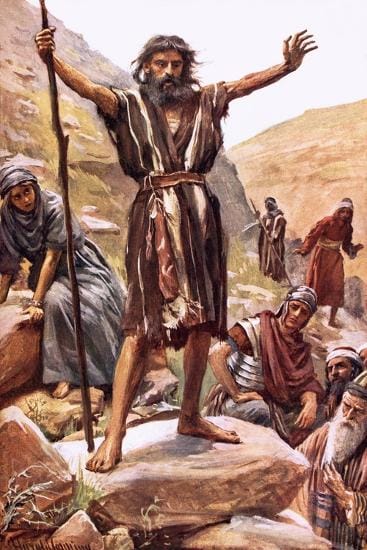
Luke1: 56- “And Mary stayed with her {Elizabeth} about three months, and {then} returned to her own home {in Nazareth}.” Because Elizabeth was six months pregnant when Mary arrived and because she stayed three months, this implies that Mary was present and probably helped with the birth of John. This also means that John grew up hearing the story of Mary and Jesus from his mother. The phrase Mary “returned to her own home” and not her parents’ home reiterates the scriptural narrative that Mary and Joseph got married immediately after Joseph’s dream and before she left to visit Elizabeth (Matthew 1:18-25).
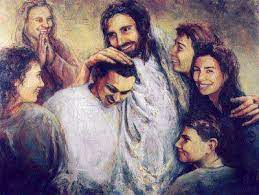
The last mention of Mary is in the Book of Acts where it states, “These all {the 11 disciples now apostles plus others} continued {as apostles} with one accord {belief in Jesus as Messiah} in prayer {to God the Father in the name of Christ} and supplication {humbly asking God for His blessing}, with {including} the women {who followed Jesus}, and Mary the mother of Jesus {Joseph had died earlier}, and with His brethren {some of Jesus’ biological siblings}.” (Acts 1:14} This clearly shows that while Mary was respected as Jesus’ mother, she was considered simply another disciple along with all the other women who followed Jesus during His ministry and came to believe that He was the Messiah. Her name was listed separate from the word women to make clear that she, as His mother, was also a believer in Jesus as Messiah. Her name is immediately followed by the mentioning that some of Jesus' biological half siblings accompanied their mother Mary at this time. This was important to note as some of Jesus’ siblings are not cited as followers. Scripture is clear that the disciples {students}, now Apostles {teachers}, did not honor her more than they did each other or the other female followers of Jesus. Nor did they venerate or pray to Mary to intercede on their behalf with her son Jesus. All first century followers were obviously considered equal brothers and sisters, or children in the family of God through their faith in the redemptive power of Christ.
Luke 1:57-80 This verse begins the birth of John and continues to the end of the chapter with a prophecy from Zachariah his father concerning the mission and ministry of his son who would become known as John the Baptizer.
If you enjoy the information provided on this site, please consider making a donation of any amount to help continue its production. Donate Now